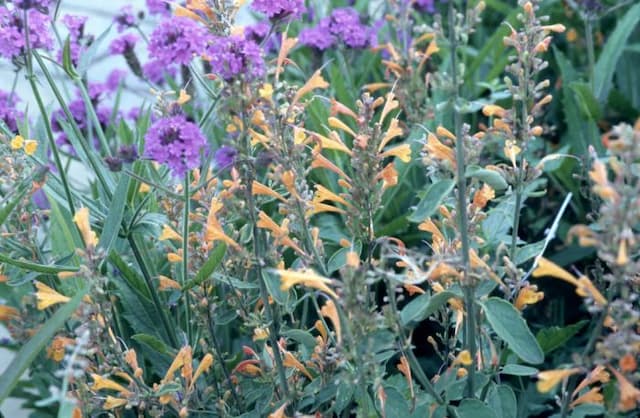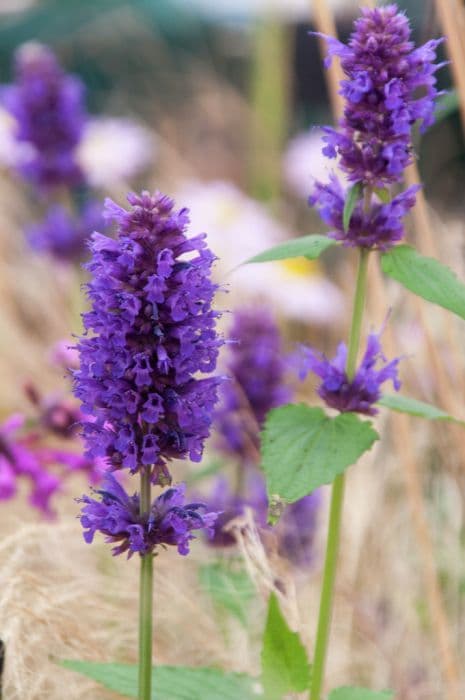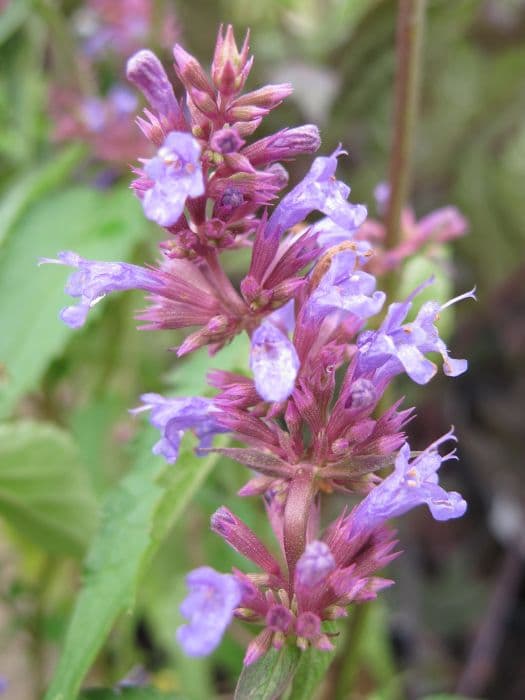Coleus 'Pineapple Beauty' Solenostemon scutellarioides 'Pineapple Beauty' (v)

ABOUT
'Pineapple Beauty' grows to 75cm, with young leaves yellow-green, later golden-yellow with a maroon centre
About this plant
 Names
NamesFamily
Lamiaceae
Synonyms
Coleus, Painted Nettle
Common names
Coleus blumei, Plectranthus scutellarioides, Coleus scutellarioides, Solenostemon scutellarioides.
 Characteristics
CharacteristicsLife cycle
Annuals
Foliage type
Evergreen
Color of leaves
Varies
Height
2 feet (60 cm)
Spread
2 feet (60 cm)
Plant type
Herb
Hardiness zones
10
Native area
Southeast Asia
Benefits
 General Benefits
General Benefits- Enhances Garden Aesthetics - Coleus 'Pineapple Beauty' adds vibrant color and textural diversity to gardens and landscapes.
- Easy to Grow - It is known for being low-maintenance and easy to care for, which is ideal for beginner gardeners.
- Attracts Pollinators - The flowers of Coleus can attract beneficial insects such as bees and butterflies to the garden.
- Versatile in Use - Can be grown in various environments such as containers, hanging baskets, beds, and borders.
- Extended Seasonal Interest - Provides long-lasting foliage interest from spring through fall.
- Rapid Growth - Coleus plants grow quickly, offering fast gratification in landscaping projects.
- Propagates Easily - They can be easily propagated from cuttings, making them cost-effective and easy to share with others.
- Shade Tolerance - The ability to thrive in shaded areas where other plants might struggle.
- Color Variety - Coleus 'Pineapple Beauty' comes in a range of colors, which can be mixed and matched for dynamic garden displays.
- Drought Tolerant - Once established, they can handle short periods of drought, reducing the need for constant watering.
 Medical Properties
Medical PropertiesThis plant is not used for medical purposes.
 Air-purifying Qualities
Air-purifying QualitiesThis plant is not specifically known for air purifying qualities.
 Other Uses
Other Uses- Coleus 'Pineapple Beauty' can be used in cut flower arrangements for its vibrant and colorful foliage, adding texture and interest to bouquets and centerpieces.
- As a natural dye, the pigments from the leaves of Coleus may be used for fabric dyeing or in artistic endeavors to create organic and unique color patterns.
- These plants can be used in educational settings, such as schools or workshops, to teach principles of horticulture, plant propagation, and design due to their ease of growth and propagation.
- Coleus 'Pineapple Beauty' can serve as a living mulch in garden beds, helping to retain soil moisture and suppress weeds with its dense foliage.
- In terrariums or fairy gardens, Coleus can be used due to its miniature landscape capabilities, providing a pop of color and a tropical feel to the scene.
- The distinctive foliage of Coleus can be used as a backdrop in photography, especially for macro or product shots, creating a visually appealing contrast.
- As an educational tool for children, growing Coleus can be used to demonstrate principles of genetic variation and hybridization due to their wide variety of colors and patterns.
- Coleus can be used in sensory gardens for its textured leaves, which vary in shape and can provide a tactile experience for visitors.
- Coleus plants can be included in animal enclosures such as those for certain reptiles, as long as their safety for the specific animal is confirmed, adding foliage and enrichment to the habitat.
- They can be used in crafting, for example, in leaf casting, where the leaves serve as molds for creating decorative cement or plaster items with the intricate patterns of the leaves.
Interesting Facts
 Feng Shui
Feng ShuiThe Coleus is not used in Feng Shui practice.
 Zodiac Sign Compitability
Zodiac Sign CompitabilityThe Coleus is not used in astrology practice.
 Plant Symbolism
Plant Symbolism- Creativity: The Coleus 'Pineapple Beauty,' with its striking patterns and vibrant colors, is often associated with creativity and the expression of imagination.
- Transformation: As the coleus can change its color intensity according to light exposure, it symbolizes adaptability and transformation.
- Sensory Pleasure: Coleus 'Pineapple Beauty' provides visual stimulation with its pineapple-like coloring, representing sensory pleasure and appreciation for beauty.
 Water
WaterColeus 'Pineapple Beauty' prefers a consistent watering schedule, where the plant is watered deeply once the top inch of soil feels dry to the touch. This may equate to watering approximately every 1-2 weeks depending on environmental conditions, but always check the moisture level first as overwatering can be detrimental. Typically, during active growth in warmer seasons, you might need 16 ounces of water per plant every week, but in cooler months, the frequency and amount should be reduced. Ensure that the plant has good drainage to prevent waterlogging. Adjust the amount and frequency of water depending on the plant’s environment and the local climate.
 Light
LightColeus 'Pineapple Beauty' thrives in bright, indirect light or part shade. The ideal spot for the plant is one where it receives morning sunlight but is protected from the harsh afternoon sun which can scorch its leaves. It can adapt to various lighting conditions but the vibrancy of its foliage may be best expressed when the plant gets sufficient light without direct exposure to the sun’s intense rays.
 Temperature
TemperatureColeus 'Pineapple Beauty' prefers temperatures between 60°F and 75°F for optimal growth. It can survive in temperatures as low as 50°F, but it should be protected from frost. The plant cannot tolerate temperatures below 30°F and should be kept away from drafts and sudden temperature fluctuations for it to thrive.
 Pruning
PruningColeus 'Pineapple Beauty' benefits from periodic pruning to encourage bushier growth and to maintain its shape. Prune by pinching back the tips of the stems, particularly if the plant is becoming leggy. Pruning is best done in the spring or early summer, but it can be done at any time to remove dead or damaged leaves. This not only promotes a more compact, attractive plant but also stimulates new growth.
 Cleaning
CleaningAs needed
 Soil
SoilColeus 'Pineapple Beauty' thrives in a well-draining, nutrient-rich potting mix with a slightly acidic to neutral pH between 6.0 and 7.0. A mix of two parts peat moss or coco coir, one part perlite, and one part compost is ideal for providing the necessary aeration and moisture retention.
 Repotting
RepottingColeus 'Pineapple Beauty' should be repotted annually or when it outgrows its current container. This frequent repotting supports its quick growth and helps rejuvenate the soil, ensuring the plant remains healthy and vibrant.
 Humidity & Misting
Humidity & MistingColeus 'Pineapple Beauty' prefers a high humidity environment, ideally between 40-70%. This plant thrives when the surrounding air has adequate moisture, but it's adaptable to average indoor humidity levels as well.
 Suitable locations
Suitable locationsIndoor
Place Coleus 'Pineapple Beauty' in bright, indirect light indoors.
Outdoor
Grow Coleus 'Pineapple Beauty' in partial shade outside.
Hardiness zone
10-11 USDA
 Life cycle
Life cycleSolenostemon scutellarioides 'Pineapple Beauty', commonly known as Pineapple Beauty Coleus, begins as a seed, requiring warmth and moisture to germinate. After germination, the seedling emerges with its first set of true leaves, developing characteristic patterns and colors of this variety. As it grows into a juvenile plant, it requires adequate light, water, and nutrients to establish a robust root system and stem structure. The mature coleus then enters a vegetative stage, where it focuses on leaf growth, achieving its vibrant foliage displays. If not pinched back, the coleus may produce small, less conspicuous flowers, though many gardeners remove these to maintain foliage vitality. Finally, as temperatures cool or conditions become unfavorable, the Pineapple Beauty Coleus will complete its cycle, either succumbing to frost or entering dormancy if grown in a container, and can be propagated by cuttings for the next season.
 Propogation
PropogationPropogation time
Spring-Summer
The Solenostemon scutellarioides, commonly known as Coleus 'Pineapple Beauty', can be easily propagated from cuttings, which is the most popular method. Preferably in spring or early summer, take a stem cutting about 4-6 inches long, making sure it has several leaf nodes. Remove the leaves from the bottom half of the cutting to expose the nodes. The exposed nodes are where roots will develop. Then, dip the cut end into rooting hormone powder to encourage root growth, which is an optional step. Place the cutting in a container filled with a well-draining potting mix and keep the soil consistently moist but not waterlogged. Within a couple of weeks, the cutting should start to develop roots, at which point it can eventually be transplanted into a larger pot or into the garden.






![Bugle [Black Scallop]](/_next/image?url=https%3A%2F%2Fplants-admin.emdemapps.com%2Fimages%2Fplants%2F%2Fimages%2F604b624330cd1.png&w=640&q=75)


